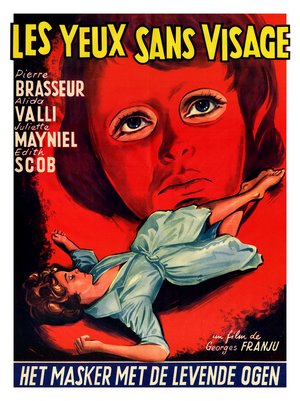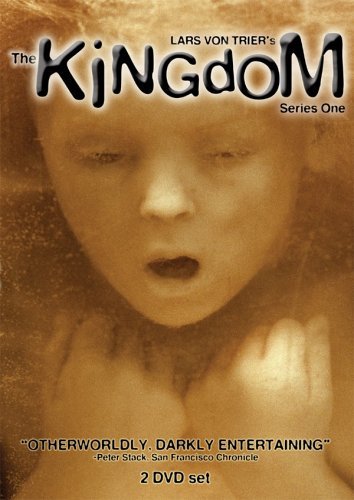Lucidno
Real Horror Shows (Eyes Withous a Face & The Kingdom)
|
Eyes Without a Face **** (Masterpiece) Directed by Georges Franju Written by Jean Redon, Pierre Boileau, Thomas Narcejac, Claude Sautet, Pierre Gascar, and Franju With Edith Scob, Pierre Brasseur, Alida Valli, Juliette Mayniel, Béatrice Altariba, François Guerin, Alexandre Rignault, and Claude Brasseur. The Kingdom ** (Worth seeing) Directed by Lars von Trier and Morten Arnfred Written by von Trier, Niels Vorsel, and Tomas Gislason With Ernst Hugo Jaregard, Kirsten Rolffes, Ghita Norby, Soren Pilmark, Holger Juul Hansen, Annevig Schelde Ebbe, Jens Okking, Otto Brandenburg, Baard Owe, and Birgitte Raabjerg. They're both arty European fantasy meditations on the medical profession — that's about all that Georges Franju's Eyes Without a Face (1959) and Lars von Trier's The Kingdom (1993) have in common, apart from the fact that they're both opening here the day after Thanksgiving. The differences between them are much more instructive. Franju's Les yeux sans visage is a poetic, compact (88 minutes) black-and-white French horror picture about skin grafting that premiered inauspiciously in the United States 32 years ago in a dubbed and reportedly mangled version known as The Horror Chamber of Dr. Faustus; happily, Facets Multimedia is showing it in its original form and subtitled. The Kingdom is a four-part, 279-minute miniseries made for Scandinavian television on color video and transferred to film, and it might be described as a supernatural Danish soap opera with allegorical overtones and offbeat inflections — a sort of Danish Twin Peaks. The Music Box is offering viewers the option of seeing it all at once or on two separate dates for the same ticket price. Though it didn't exactly bore me, I must confess that The Kingdom was a disappointment after what I'd been hearing from friends in New York. For all the thematic ambitions of von Trier's 1991 Zentropa, what impressed me about it was its fancy technique and visual style; after all, this feature was shot mainly in black and white by Henning Bendtsen, the same man who shot Carl Dreyer's Ordet and Gertrud. These virtues pretty much go out the window in The Kingdom, where the primitive colors (most of which seem to be citrus-tinted) and the rough, pixel-laden textures sometimes make it look as if the movie were being projected on burlap. Early in the third episode, in a sequence involving a lit candle and a face in close-up, this texture improves substantially — making me wonder whether von Trier or his codirector, Morten Arnfred, might have shot a few bits on film or found a better lab for video-to-film transfers. But before long it goes back to the same old mottled video textures again. No less annoying is the crude miniseries structuring — mechanical crosscutting between one set of characters and another, guaranteeing that we never stay with any single story line for long. This as well as the visual crudeness might have irritated me less if I were watching it on TV, where such simplicities are routinely tolerated in exchange for the comforts of being at home. We're living through a transitional period when it comes to film and video. |
Reviewers are often expected to ignore the differences between the media while both filmmakers and video artists are obliged to present their work in a transferred state: video artists usually have to transfer their work to film if they want it to be shown at film festivals, and many independent film artists who can't afford to set up preview screenings for reviewers find themselves settling for "preview tapes" instead. On the other hand, the handheld-camera movements and deliberately ragged and unconventional cutting of The Kingdom give the work a documentary feel that meshes interestingly with the outlandish material: the story involves ghosts, stolen body parts, mental telepathy, a secret society of doctors (known as "Sons of the Kingdom"), conspiracies, voodoo research (which takes one leading character to Haiti), and old medical reports buried in archives. For this is a miniseries about what might be described as a palace intrigue, medieval in flavor even though it's set in a contemporary hospital. Indeed, the best of The Kingdom may remind us more of the literary fantasy of Mervyn Peake's Gormenghast trilogy than of Paddy Chayefsky's The Hospital. The downside of this resemblance is that Peake's vision would call for a big-screen movie, not a video transfer like The Kingdom. (And Chayefsky's pinched and bloated vision is TV to the core, whether or not it's on a big screen.) I'm not sure how much The Kingdom has to say about Scandinavia in general and Denmark in particular, but there seems little doubt that von Trier wants it to say a lot. Unfortunately, the hospital-as-nation metaphor seems almost as unwieldy and pretentious here as it was in Lindsay Anderson's top-heavy satire Britannia Hospital (1982), and periodic aerial shots over an enormous building that's supposed to be "the Kingdom" (i.e., the hospital) are more rhetorical than convincing. Arguably The Kingdom works better as a weirdo cult item than as the grandstanding state-of-the-union address it sometimes pretends to be. For instance, the anti-Danish gibes of Stig Helmer (Ernst Hugo Jaregard), a petulant Swedish doctor, made more sense to me as an eccentric character trait à la Twin Peaks than as a telling illustration of Scandinavian rivalries. (The film is coproduced, incidentally, by Danish, Swedish, and "Nordic" television.) A couple of years ago, during my only trip to Scandinavia, I was giving a lecture about American cult films at the annual convention of the Norwegian federation of film societies when someone suggested I put on a video of a suppressed Norwegian TV kids show of the 70s as an example of a much-discussed local cult item. This black-and-white slapstick piece about a couple of house painters didn't have much coherent dialogue (which made it pretty easy for me to follow), but it did have a fair amount of nastiness and malevolence. It had been taken off the air for fear of upsetting children, and many of the film-society directors present, who were kids at the time, grew to cherish it over the years precisely because it was unavailable. A similar cult infatuation with Twin Peaks has developed since the TV show and subsequent feature flopped with the mass audience, manifesting itself in such efforts as a hardy 'zine called Wrapped in Plastic. One wonders if The Kingdom may be undergoing such a transformation in Scandinavia. According to an article about von Trier in the November-December issue of Film Comment, the series is "still in progress," though the film's press book doesn't allude to any more episodes in production or preproduction. (Von Trier's Dimension, on the other hand, has a projected production schedule that runs from 1991 to 2024, and his Breaking the Waves is said to be in preproduction.) Though the first four episodes of The Kingdom build to an elaborately crosscut and partially satisfying string of climaxes, one can't be sure whether the story has truly ended or not; perhaps von Trier doesn't know himself. *** |



